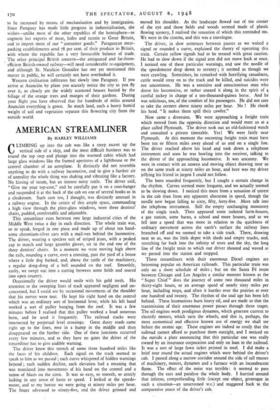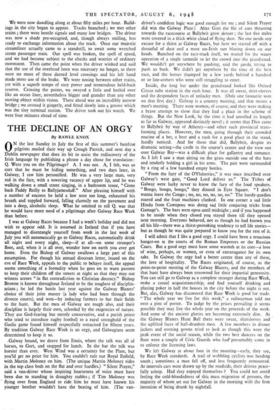AMERICAN STREAMLINER
By HARLEY WILLIAMS
CLIMBING up into the cab was like a steep ascent up the vertical side of a ship, and the most difficult business was to round the top step and plunge into the warmed cabin which had large glass windows like the framed apertures of a lighthouse or the control chamber of an aeroplane. It distinctly did not resemble anything to do with a railway locomotive, and to give a further air of unreality the whole thing was shaking and vibrating like a factory. No hissing of steam, but an intense noisy rattle. The driver said, " Give me your top-coat," and he carefully put it on a coat-hanger and suspended it at the back of the cab on one of several hooks as in a cloakroom. Such care too, I thought, was distinctly unusual in a railway engine. In the centre of this ample space, commanding a high view through the plate-glass windows, were three dentists' chairs, padded, comfortable and adjustable.
This streamliner runs between two large industrial cities of the Middle West twice a day in each direction. The whole train was, so to speak, forged in one piece and made up of about ten hand- some chromium-silver cars with a mail-van behind the locomotive. The driver, wearing a spotless suit of striped jeans, with a peaked cap to match and large gauntlet gloves, sat in the end one of the three dentists' chairs. In a moment we were moving high above the rails, rounding a curve, over a crossing, past the yard of a house where a little dog barked, and, above the rattle of the machinery, a regular dong-dong of a bell sounded on the roof. Smoothly, easily, we swept out into a cutting between some fields and soared into open country.
Occasionally the driver would smile with his gold teeth. His attention to the sweeping lines of track appeared negligent and un- concerned, but I could see by occasional movements of the shoulder that his nerves were taut. He kept his right hand on the control which was an ordinary sort of horizontal lever, while his left hand worked a sort of pulley hanging from the roof. It was a few minutes before I realised that this pulley worked a loud sonorous horn, and he used it frequently. The railroad tracks were intersected by perpetual level crossings. Great dusty roads came right up to the lines, rose in a hump in the middle and then disappeared on the further side. One of these junctions occurred every few minutes, and as they have no gates the driver of the streamliner has to give audible warning.
The driver knew this stretch of some three hundred miles like the faces of his children. Each signal on the track seemed to speak to him as we passed ; each curve whispered of hidden warnings beyond ; each sudden decline, each elevation had a meaning that was translated into movements of his hand on the control and a tattoo of blasts on the siren. It was so easy, so smooth, so utterly lacking in any sense of haste or speed. I lociked at the speedo- meter, and to my horror we were going at ninety miles per hour. The finger advanced to ninety-five, and the driver grinned and
moved his shoulder. As the landscape flowed out of the corner of the eye and those fields and woods seemed made of plastic flowing scenery, I realised the sensation of which this reminded me. We were in the cinema, and this was a travelogue.
The driver, in slow sentences between pauses as we waited a signal or rounded a curve, explained the theory of operating this train. Certain yellow signals had to be treated with great caution. He had to slow down if the signal arm did not move back at once. I noticed one of these particular warnings, and saw the needle of the speedometer drop down to seventy ; it seemed as though we were crawling. Sometimes, he remarked with horrifying casualness, cattle would stray on to the track and be killed, and suicides were not uncommon. He was a sensitive and conscientious man who drove his locomotive, or rather coaxed it along in the spirit of a careful jockey in charge of a ten-thousand-guinea horse. And he was solicitous, too, of the comfort of his passengers. He did not care to take the corners above ninety miles per hour. No ! He shook his head. " It makes them spill their cawfee."
Now came a diversion. We were approaching a freight train which moved from the opposite direction and would meet us at a place called Plymouth. The driver took out an old-fashioned watch and consulted a private timetable. Yes! We were fairly near Plymouth. At this moment the oncoming freight train must have been ten or fifteen miles away ahead of us and on a single line. The driver reached above his head and took down a telephone instrument and soon he was bawling into the receiver, talking to the driver of the approaching locomotive. It was uncanny. We were in contact with an unseen and moving object drawing near us on the same track at ninety miles an hour, and here was my driver jollying his friend in jargon I could not follow.
The horn sounded frequently, but I caught a certain change in the rhythm. Curves seemed more frequent, and we actually seemed to be slowing down. I noticed this more from a sensation of unrest in the cab than from any apparent alteration in speed, though the needle now began falling to sixty, fifty, forty-five. More talk into the telephone instrument. Still the empty unchanging monotony of the single track. Then appeared some isolated farm-houses, a gas station, some barns, a school and more houses, and as we fell into a speed that was more in relation to the quickness of ordinary movement across the earth's surface the railway lines branched off and we seemed to take a side track. There, drawing near to us, was the little depot with sheds and empty trucks, and, stretching far back into the infinity of trees and the sky, the long line of the freight train to which our driver shouted and waved as we passed into the station and stopped.
These streamliners with their enormous Diesel engines are becoming popular on American railroads. This particular train was only on a short schedule of miles ; but on the Santa Fe route between Chicago and Los Angeles a similar monster known as the " Super Chief " does the journey of some two thousand miles in thirty-eight hours, or an average speed of nearly sixty miles per hour, including stops, and often it hurtles over the prairies at over one hundred and twenty. The rhythm of the coal age has been left behind. These locomotives burn heavy oil, and are made so that the transmission of their enormous power passes through three stages. The oil engines work prodigious dynamos, which generate current to electrify motors, which turn the wheels, and this is, perhaps, the most economical and effective known use of energy we shall see before the atomic age. These engines are indeed so costly that the railroad cannot afford to purchase them outright, and I noticed on the outside a plate announcing that this particular one was really owned by an insurance corporation and only on loan to the railroad. It was a sort of large fawn ticket printed in steel. I did make a brief tour round the actual engines which were behind the driver's cab. I passed along a narrow corridor around the side of tall masses of machinery, motors, dynamos and a furnace with an incandescent flame. The effect of the noise was terrible: it seemed to pass through the ears and paralyse the whole body. I hurried around that inferno, comprehending little (except one object, grotesque in such a situation—an unscreened w.c.) and staggered back to the comparative peace of the driver's cab. We were now dawdling along at about fifty miles per hour. Build- ings in the city began to appear. Tracks branched ; we met other trains ; there were hostile signals and many low bridges. The driver was now a shade pre-occupied, and, though always smiling, less ready to exchange information about the track. Once our majestic streamliner actually came to a standstill, to await some wretched steam passenger train. Our spell was broken, the spell of speed, and we had become subject to the checks and worries of ordinary movement. Then came the point when the driver winked and said that the use of the overhead horn was necessary no longer, as there were no more of these darned level crossings and his left hand made more use of the brake. We were nosing between other trains, yet with a superb tempo of easy power and tremendous held-back reserve. Crossing the points, we swayed a little and heeled over like an ocean liner, nevertheless bigger and grander than any other moving object within vision. There ahead was an incredibly narrow bridge ; we crossed it gingerly, and fitted slowly into a groove which was the tiny terminal station. The driver took out his watch. We were four minutes ahead of time.



































 Previous page
Previous page